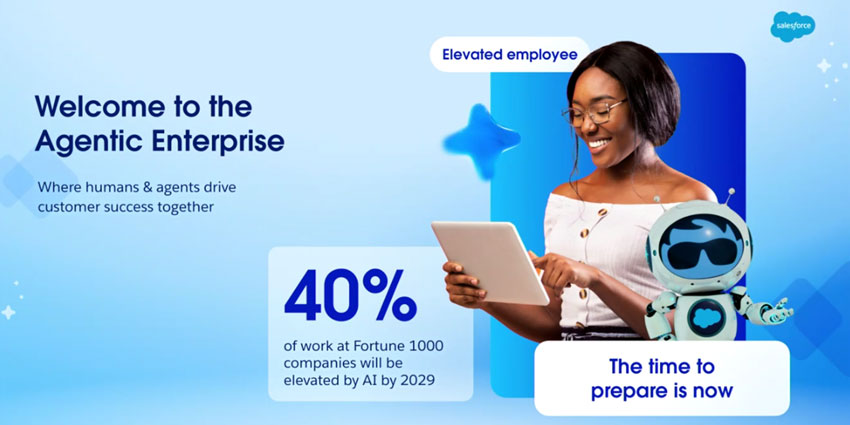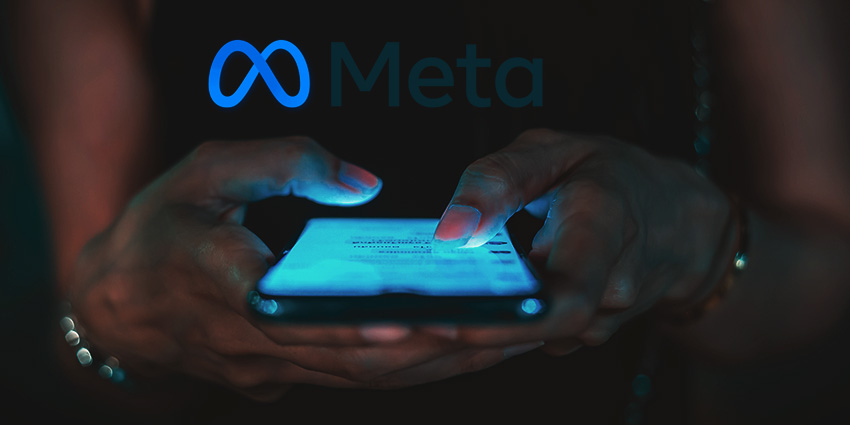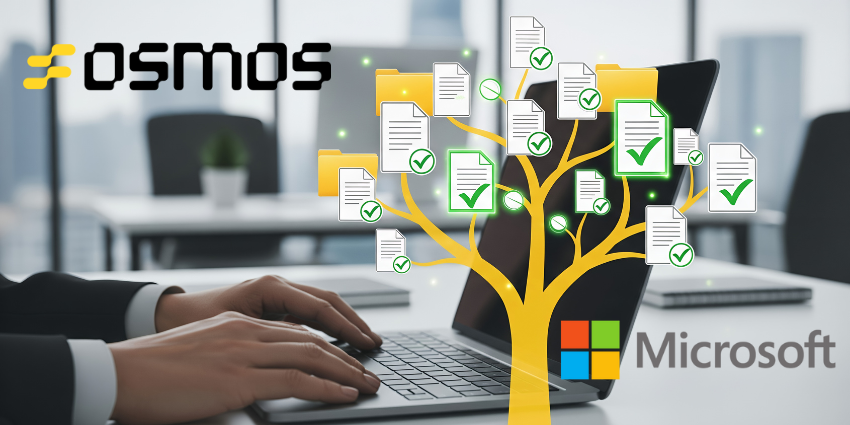50,000 people are descending on San Francisco for one of the biggest events in the enterprise technology calendar: Dreamforce.
The 23rd annual conference is Salesforce’s chance to showcase its latest innovations, share success stories, and enable customers to network.
In the run-up to the event, the CRM leader has made several massive announcements.
For starters, it pushed into the ITSM space, converging IT, customer, and HR service on one platform.
Additionally, it launched MuleSoft Agent Fabric, a solution where brands can register each AI agent the business utilizes, orchestrate them, and monitor performance. With this, Salesforce hopes to tackle “agent sprawl”, an issue where AI agents – disconnected across the enterprise – drive compliance risks and operational inefficiencies.
Meanwhile, Salesforce also renamed Service Cloud, an app used by 60,000 businesses, embedding native AI agents. Now, it’s called: “Agentforce Service”.
That was all before the event. However, Marc Benioff, CEO of Salesforce, will share several other massive announcements during his keynote.
CX Today was lucky enough to receive a sneak preview beforehand and can share the biggest news ahead of Dreamforce 2025 kick-off this week.
1. Salesforce Introduces the Agentic Enterprise
Salesforce set out its vision for the enterprise of tomorrow, which it’s calling the “Agentic Enterprise”.
According to Salesforce, the Agentic Enterprise signals a new model for work where AI helps elevate people, as opposed to replacing them.
In such an enterprise, a team operates with “24/7 intelligence”, so every employee has an “AI partner” that completes role-based tasks on their behalf and augments others.
Don’t think of a copilot that supports, partners that act, aided by the broader Salesforce platform. Most notably, Data Cloud and Slack (more on this later!).
As part of this vision, Salesforce touts sales leads that are “never missed” and service that “never sleeps”, as customer-facing functions become semi-autonomous.
To realize that vision, businesses must bridge the gap between CRM and the broader business.
Recognizing this, Martin Schneider, VP & Principal Analyst at Constellation Research, observed:
Salesforce’s Agentic Enterprise vision makes a lot of sense when you consider how much vibe coding, and AI in general is going to further commoditize the CRM application/pricing model.
“Also, as agentic AI blurs the lines between applications and data silos as well as jobs to be done, it simply makes sense to start thinking in broader terms of how we optimize end-to-end processes with agentic flows and tools.”
Schneider’s perspective of the Agentic Enterprise set the stalls for the next major announcement…
2. The Agentforce 360 Platform Takes Salesforce “Beyond CRM”
The Agentforce 360 Platform is the next evolution of Agentforce. At last year’s Dreamforce event, came the first Agentforce solution. Since then, the solution has had three new iterations, culminating in June’s launch of Agentforce 3.
Now, the Agentforce 360 Platform is the next iteration, taking Salesforce “beyond CRM”.
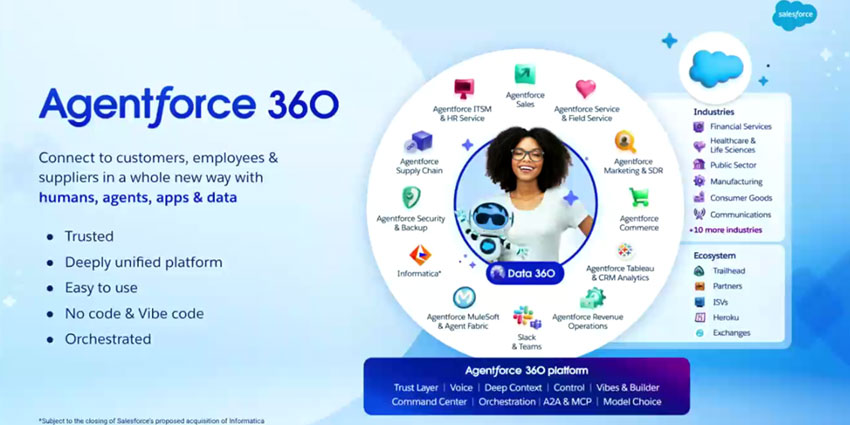
As such, the Agentforce 360 Platform is supporting customer-facing teams in automating longer-tail tasks, which cross enterprise platforms.
Moreover, it’s supporting other departments – like IT and HR teams – in creating, operationalizing, and optimizing AI agents. These can also complete tasks on their behalf, simplify workflows, and collaborate.
Yet, the Agentforce 360 Platform is just one part of the Agentforce 360 portfolio, which also includes Data 360 (formerly Data Cloud), its Customer 360 apps, and Slack.
According to Salesforce, these are the “four ingredients of an Agentic Enterprise”, connecting AI agents, data, apps, and – of course – humans.
To underscore the significance of its Agentforce 360 announcement, Salesforce has also renamed its Customer 360 apps. So, it’s not only Service Cloud becoming Agentforce Service. Sales Cloud is now Agentic Sales, Marketing Cloud is Agent Marketing, and so forth, with each app including embedded Agentforce agents.
Summarizing the offering, Srini Tallapragada, President & Chief Engineering, & Customer Success Officer at Salesforce, said:
[Agentforce 360] will help you connect with your customers, employees, and partners in a completely new, trusted way… And it’s tightly integrated with Slack, where most of the work gets done.
That leads on to the big Slack news…
3. Slack and Salesforce Collide
Slack is not only becoming the front end of Agentforce, but the agentic operating system, where employees – AI and human – can search, collaborate, and act across their organizations.
Indeed, Salesforce now refers to Slack as the “Agentic OS” for the enterprise.
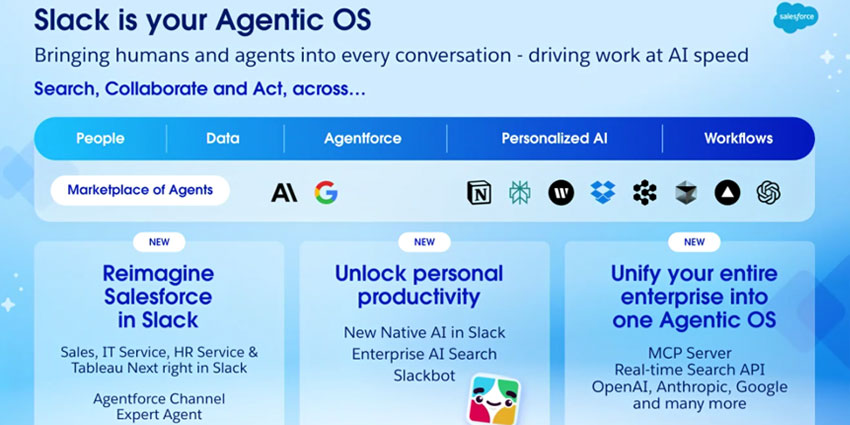
As part of this vision, employees may trigger actions within and share critical data from enterprise apps without leaving Slack. Instead, they can ask their AI partners to complete the actions for them.
Salesforce refers to these as “conversations in the flow of work”, which will become the foundation of Slack, per Rebecca Wetteman, CEO & Principal Analyst at Valoir.
“What Salesforce is doing with the Slack announcements is embracing the Slack community, which is really important, but also making the Slack-Salesforce-Agentforce connections much more explicit,” noted Wetteman.
The idea of Slack as the conversational interface where humans and agents interact – without the need to ever go to Salesforce or any other application – is about frictionless productivity.
As Wetteman suggests, Slack provides for Salesforce a great middle ground for bringing AI into the flow of work and CRM insights into a much more fluid and well-adapted user experience.
4. Salesforce Acquires Apromore
Salesforce has agreed to acquire Apromore, a prominent provider of process intelligence tech.
Indeed, its tech aspires to offer “full-spectrum process intelligence visibility”, from front-line task execution to enterprise-wide process flows.
To do so, it monitors everything – across disparate systems – from clicks and keystrokes to system logs, models, and simulations to provide “end-to-end intelligence”.
As such, the acquisition appears to be a significant addition to the Agentforce 360 Platform, as it may allow Salesforce customers to map out, standardize, and simplify employee workflows.
From there, they may deploy custom Agentforce agents to multiply efficiencies, which could handle entire end-to-end processes. Alternatively, the agents may become available on Slack to collaborate with human employees as they complete tasks.
Celebrating such a possibility, Steve Fisher, President and Chief Product Officer, said:
As our teams integrate Apromore into Salesforce, that insight will be critical to enabling our customers to unlock opportunities to measure, optimize, and automate through agentic process automation.
Here, Fisher recognizes the importance of customers being able to trust AI, especially as Salesforce moves to its Agentic Enterprise vision.
“Early failures with AI experiments have pushed many from FOMO to FOMU (fear of messing up),” said Wetteman, building on this point. “Management, testing, and monitoring capabilities like Salesforce have developed and are continuing to announce are a key part of building that trust.”
5. Salesforce & OpenAI Team Up on Agentforce 360
Salesforce and OpenAI have expanded their partnership to allow Agentforce 360 customers to pull customer conversations, sales records, and even Tableau visualizations into ChatGPT, where they can query them.
To support this, both tech giants announced a ChatGPT app for Slack, pulling the AI engine into the collaboration platform.
Alongside the new app, Codex will also become available in Slack, which is an OpenAI agent that writes and edits code based on natural language prompts. Users can tag this inside a Slack channel or thread.
Additionally, the partnership means Agentforce 360 Platform users may leverage OpenAI’s latest frontier models, including GPT-5, to develop new Agentforce agents.
Celebrating the announcement, Sam Altman, Co-founder and CEO at OpenAI, said:
Our partnership with Salesforce is about making the tools people use every day work better together, so work feels more natural and connected.
Finally, Salesforce and OpenAI announced that Agentforce Commerce (formerly Commerce Cloud) will integrate with OpenAI’s Agentic Commerce Protocol, a new standard that powers Instant Checkout in ChatGPT.
In doing so, Salesforce promises to give “merchants a new way to reach hundreds of millions of potential customers.”
6. Salesforce & Anothropic Partner on AI for Regulated Industries
Salesforce has established a milestone partnership with another AI leader: Anthropic.
This collaboration has three key elements. First, Anthropic’s Claude AI models will serve as a “preferred option” for businesses in regulated industries – including finance, healthcare, and life sciences – building AI agents on Agentforce while keeping sensitive data securely within Salesforce’s systems.
Second is a commitment to co-delivering “industry-specific AI solutions” for those industries, starting with financial services. These will be available via the Agentforce 360 Platform.
Finally, Claude will become “deeply” integrated with Slack, with the two companies also sharing plans to bring Agentforce 360 into Claude.
Sharing more on this final announcement, Benioff stated: “By bringing Salesforce directly into Claude — and Claude’s intelligence into Salesforce and Slack — we’re giving every company the power to work in entirely new ways.
Together, we’re making trusted, agentic AI real for every industry — combining Anthropic’s world-class models with the trust, reliability, accuracy, and scale of Agentforce 360, helping customers achieve new levels of productivity, innovation, and growth.
Already, Claude and Slack bi-directional integrations are available, with the industry-specific solutions still under development.
7. PWC Launches an “Agentic AI-Powered Contact Center” with Salesforce
PWC is a global professional services company that usually helps businesses procure, deploy, and manage third-party CCaaS solutions from the likes of AWS, Genesys, and NiCE.
However, it stole the Dreamforce spotlight to launch its “Agentic AI-Powered contact center offering”, built in collaboration with Salesforce.
Indeed, PWC’s offering layers over Agentforce Service (formerly Service Cloud), integrating conversational AI, predictive ordering, and a data layer that ensures all service data collected by its solution filters into the CRM.
PWC celebrated the launch as an opportunity to “reimagine customer engagement”, claiming to already be working with a “large, multinational company” as an early adopter.
According to the service provider, that company is already transforming how it engages with “millions of customers” globally.
Now, it will drive to bring the solution to its “vast global network of call centers”, promising “measurable outcomes”.
Celebrating the announcement, Kishan Chetan, EVP & GM of Agentforce Service at Salesforce, said: “With Agentforce Service, we’re empowering service representatives with conversational AI and unified customer data, significantly boosting their productivity and elevating assisted service to the next level of engagement.
Together with PwC, we’re creating a repeatable model for customer transformation that any enterprise can scale.
Alongside OpenAI, Anthropic, and PWC, Dreamforce will offer many other high-profile partners the chance to add exciting innovations to the Salesforce ecosystem.
Another excellent example is Vonage, which announced a fraud detection tool for mutual Salesforce customers, amid surging attacks on Agentforce Service.
More announcements will follow as Dreamforce 2025 rolls on. Stay tuned!
